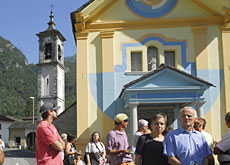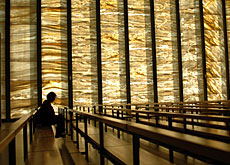Faith, love and the evangelicals

It’s a late summer Sunday morning and there’s little sign of life on the streets of Bern’s western suburbs. But below ground it’s a different matter.
The music is loud, the songs modern – and mainly sung in English – with the words projected onto huge screens. People are swaying to the music or raising their arms to the ceiling.
A visit to Bern’s Pentecostal church, known as Pfimi, is an eye-opener for those whose image of the church is wooden pews and old-fashioned hymns. With its youth bands, café and shop, this is a very 21st-century church, catering to today’s tastes.
While many Reformed and Catholic churches are struggling to fill their pews, the Pfimi is so popular that it’s standing room only for latecomers. More than 600 are packed into the purpose-built church hall, not including 200 or so children divided among different Sunday school classes. Total membership is over 700.
So what’s the attraction? “I like the atmosphere: the people are great and I feel very loved,” says Andy Owen, a young Swiss-American who’s been attending the church for 12 years.
“For me it’s the relationships with people,” echoes 44-year-old Jan Vauclair. “But the most important thing is being able to hear God’s word and to practise my faith. I feel supported in that by the many friends we have here.”
Progressive
The Pentecostal church is part of the Swiss Evangelical Alliance (SEA), which groups together many so-called free churches – churches which do not enjoy state recognition and do not receive a share of the church tax levied on individuals by the cantonal authorities.
“Usually the free churches are very progressive in format, in how they conduct services, and quite traditional in content,” says SEA general secretary Hansjörg Leutwyler.
“I believe that because they see the Bible as being true – the vital authority – this is what attracts people, and quite often the state churches might not teach that.”
For Jörg Stolz, a Lausanne University researcher on religion, the success of evangelical churches is down to a mixture of “strong beliefs” conveyed in a modern way and “a lot of emotionality”.
“[This is] something that is often lacking in the Catholic and Reformed churches. But it comes at a price: evangelical groups often exercise a lot of social control. If you enter one of these groups, your way of life has to change, adapted to certain norms. This means it is a life-changing experience.”
Mission
Pfimi pastor Ivano Lai sums up his church’s mission in simple terms: “We try to bring the Gospel to the common people, to address their life problems.”
But there’s much more to it than delivering a good sermon. “The life of the church is not the service on Sunday morning: it’s at the meetings in people’s homes where we really have fellowship,” says Pastor Lai.
A big draw for young people are the youth meetings on Friday nights and outdoor activities on Saturdays.
Leutwyler says that despite society’s drift away from organised religion, many young people are still finding their way back to church.
“Where there is life, where there is authority given to Scripture, that is what young people seek. And if there is a good band, if there’s an attractive programme for them, that helps as well.
“Young people long for values, they seek a good way to live their life, and [discover] they can have fun as well within the environment of a church.”
The Pfimi is having to put on an extra Sunday service to cope with demand, but Pastor Lai sees the biggest challenge outside the church’s doors.
“We are happy on the one hand but we’re sad to see so many people in society with broken lives. Sometimes it’s hard to reach them – that’s the sad part.”
swissinfo, Morven McLean
In 2000, 161,075 people or 2.2% of the population belonged to so-called free churches (non-state recognised Christian denominations).
In 1990 the number belonging to these denominations totalled 151,289
According to the Federal Statistics Office, the free churches attract a higher than average proportion of young people, families and children than the state-recognised branches of the Christian church.
Just 18.2% of their members are aged 60 plus, compared with 26.2% in the Reformed Protestant church.
The free Protestant churches also have more foreign members than the Reformed church.
The church started in 1918, when it had 15-20 members and met in central Bern.
It moved to a purpose-built building in the western suburbs of Bern in 1996.
There are currently around 720 members plus children.
Members pay SFr100 a year to the Swiss Pentecostal Mission to support missionary work.
The pastoral team consists of 4 people, plus a youth group leader.

In compliance with the JTI standards
More: SWI swissinfo.ch certified by the Journalism Trust Initiative




You can find an overview of ongoing debates with our journalists here. Please join us!
If you want to start a conversation about a topic raised in this article or want to report factual errors, email us at english@swissinfo.ch.